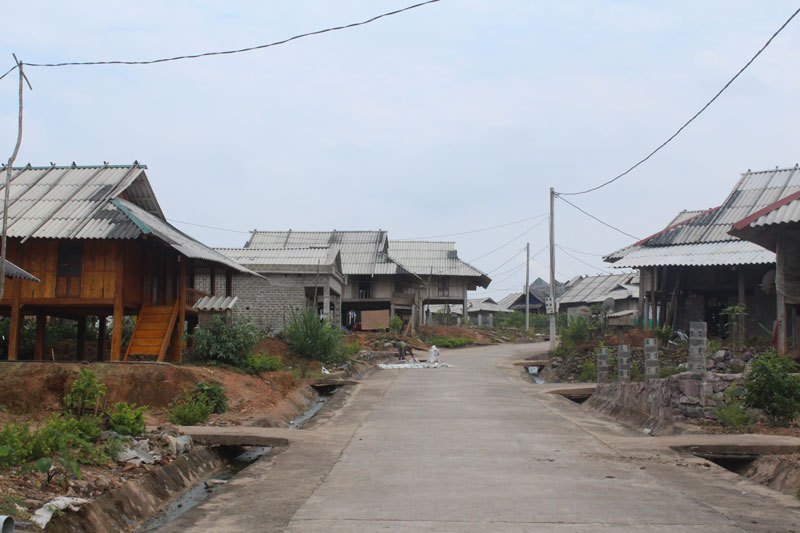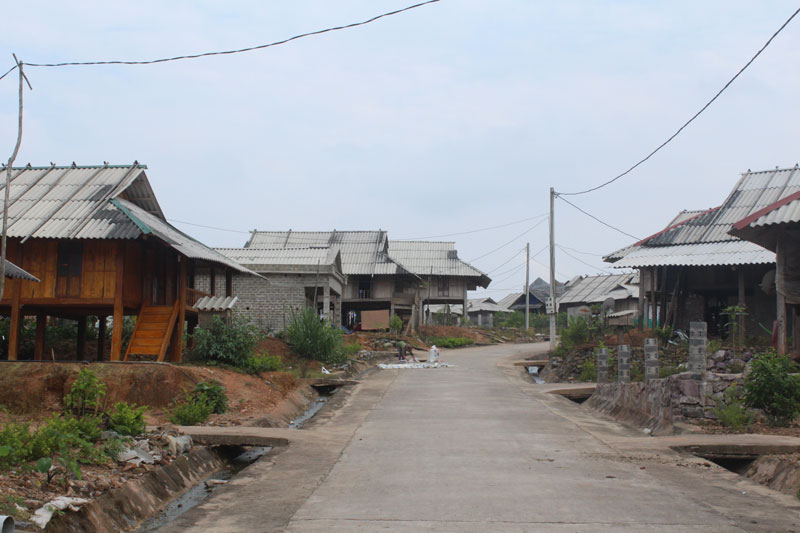
(HBO) - Over the past five years, the provincial architects’ association has mapped out detailed plans for some important projects such as adjusting the overall plan for building Vu Ban town in Lac Son district through 2025, with a vision to 2035; and making a detailed plan for building administrative, commercial services, and sports and new residential areas on the Buoi river’s banks in Lac Son district.
 To assist people whose houses were damaged by recent
flashfloods and landslides, the architects’ association of Hoa Binh province has
promptly designed construction works under a technical infrastructure project
at Bua Coc resettlement area in Suoi Nanh commune, Da Bac district.
To assist people whose houses were damaged by recent
flashfloods and landslides, the architects’ association of Hoa Binh province has
promptly designed construction works under a technical infrastructure project
at Bua Coc resettlement area in Suoi Nanh commune, Da Bac district.
Besides, the association has
designed construction works under a technical infrastructure project at
resettlement areas due to landslides in localities in Da Bac district such as
Lau Bai hamlet – Vay Nua commune, Ke hamlet – Muong Chieng commune, Bua Coc
hamlet – Suoi Nanh commune, Nhap hamlet – Dong Ruong commune, and Tup hamlet –
Tien Phong commune; and surveyed the designing work for headquarters of social
security agencies in Ky Son, Lac Thuy, Mai Chau and Yen Thuy districts.
The development of infrastructure has created momentum
for investment attraction. Therefore, the association has provided consultancy
for the conduction of topographic surveys and detailed plans for building Yen
Mong industrial cluster in zones 1 and 2, and Cham Mat - Dan Chu industrial
complex in Hoa Binh city.
The association also defines planning as an
important task in the coming time, especially urban building. It considers the
planning of specific functional areas as a strategy towards long-term and sustainable
development.
It strives to focus on
developing high-quality and modern integrated urban centres, high technology
and eco-agriculture.
As Hoa Binh city is expanding its area and
merging Ky Son district into the city, the planning work has become more
significant to the sustainable development of the province in general and the
city in particular./.
According to data from the Hoa Binh Provincial Party Committee, the industrial production index for the first six months of 2025 is estimated to have increased by 20% compared to the same period last year. This marks the highest year-on-year growth rate for this period since 2020.
In the first six months of 2025, Hoa Binh province’s export turnover was estimated at 1.145 billion USD, marking an 18.11% increase compared to the same period in 2024. Import turnover was estimated at $ 804 million, a 17.15% increase, which helped the province maintain a positive trade balance.
The lives of the ethnic minority farmers in Tan Lac district have gradually improved thanks to the new directions in agricultural production. This is a testament to the collective strength fostered through the professional associations and groups implemented by various levels of the district’s Farmers’ Union.
With the motto the "product quality comes first,” after nearly one year of establishment and operation, Muong village’s Clean Food Agricultural and Commercial Cooperative, located in Cau Hamlet, Hung Son Commune (Kim Boi district), has launched reputable, high-quality agricultural products to the market that are well-received by consumers. The products such as Muong village’s pork sausage, salt-cured chicken, and salt-cured pork hocks have gradually carved out a place in the market and they are on the path to obtaining the OCOP certification.
In the past, the phrase "bumper harvest, rock-bottom prices" was a familiar refrain for Vietnamese farmers engaged in fragmented, small-scale agriculture. But today, a new spirit is emerging across rural areas of Hoa Binh province - one of collaboration, organisation, and collective economic models that provide a stable foundation for production.
Maintaining growing area codes and packing facility codes in accordance with regulations is a mandatory requirement for agricultural products to be eligible for export. Recently, the Department of Agriculture and Environment of Hoa Binh province has intensified technical supervision of designated farming areas and packing facilities to safeguard the "green passport" that enables its products to access international markets.



 To assist people whose houses were damaged by recent
flashfloods and landslides, the architects’ association of Hoa Binh province has
promptly designed construction works under a technical infrastructure project
at Bua Coc resettlement area in Suoi Nanh commune, Da Bac district.
To assist people whose houses were damaged by recent
flashfloods and landslides, the architects’ association of Hoa Binh province has
promptly designed construction works under a technical infrastructure project
at Bua Coc resettlement area in Suoi Nanh commune, Da Bac district.